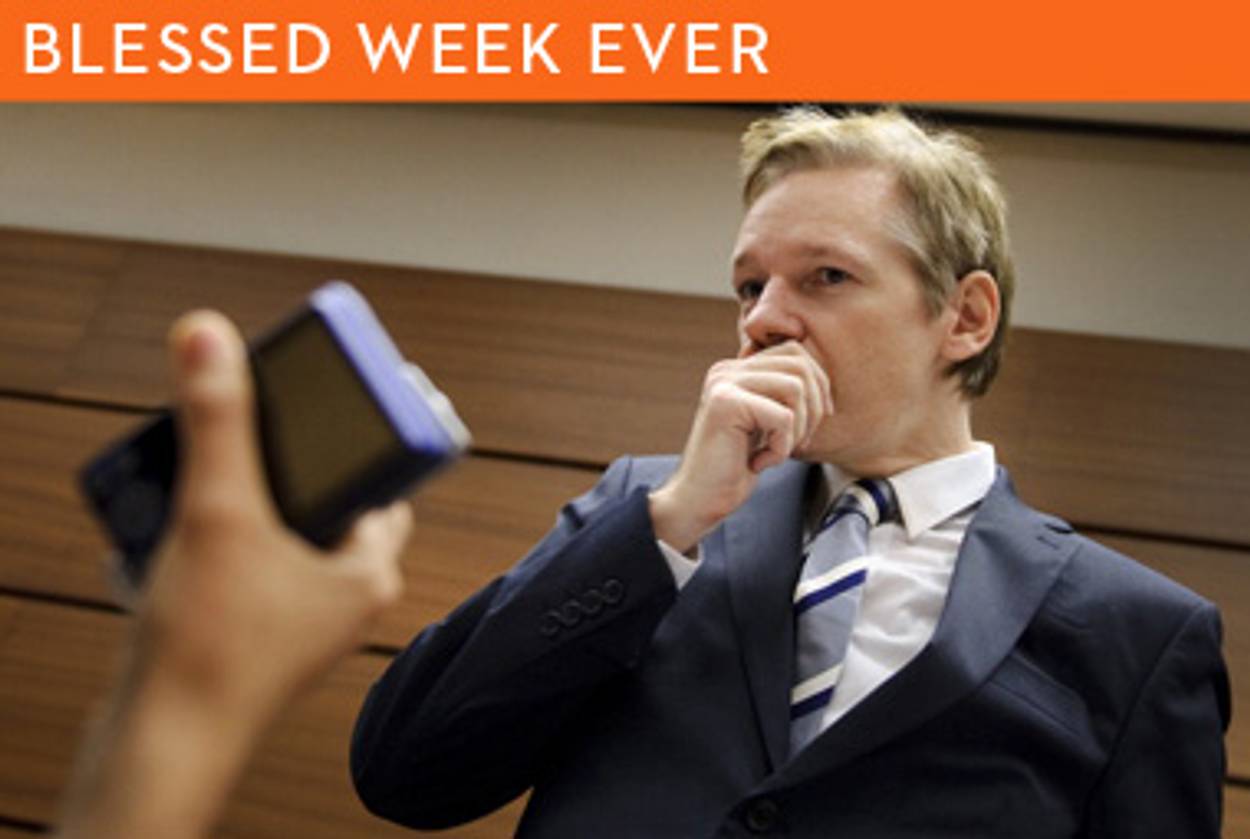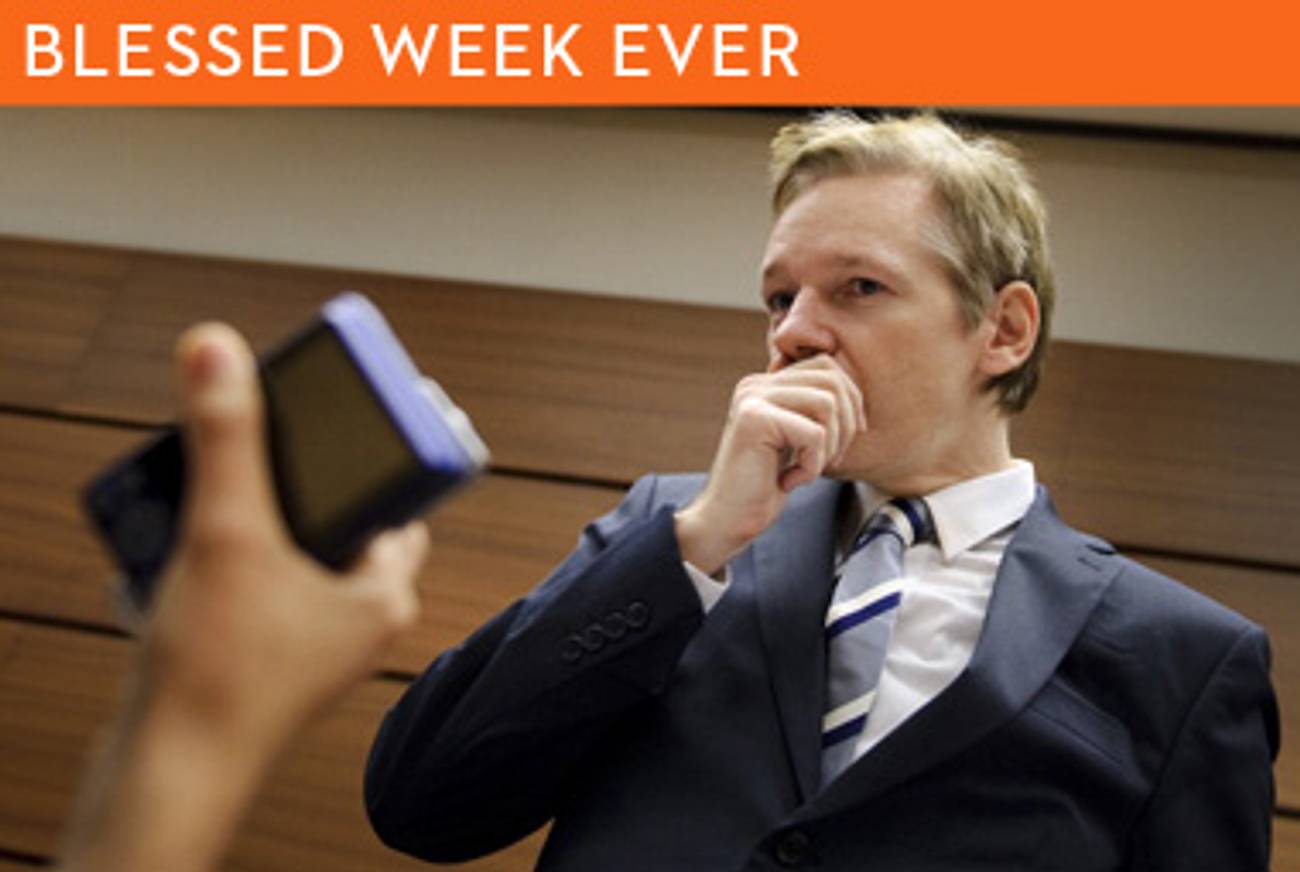Leaky Weeks
Joseph, the hero of this week’s parasha, could teach Wikileaks’ Julian Assange a thing or two about personal responsibility




As Wikileaks founder Julian Assange is being held in British custody—fighting his extradition to Sweden, where he is accused of sexual assault—he might use his time to brush up on his Bible. If he reads this week’s Torah portion, he may find cause for reflection.
It tells of Joseph, now reconciled with his treacherous brothers, and his struggle to keep Egypt afloat during a terrible and prolonged drought. Disgruntled, the people come to Joseph and demand satisfaction. “Give us food,” they say. “Why should we die in your presence, since the money has been used up?” But Joseph is tough and effective. He collects all the remaining cash, barters food for livestock, and sustains the economy throughout a volatile period. He is a paragon of good government and the embodiment of personal responsibility.
Assange is not. The man who famously expressed his glee at crushing bastards has never specified just who the bastards might be, but his behavior leaves little room for doubt: While he does not appear to be a classical, ideological anarchist, Assange seems imbued with the lawless spirit that represents so much of what is good and what is reprehensible about the Internet; the bastards he enjoys crushing are people with power, and it is their power, more than any concrete fault or inherent flaw, that makes them worthy of crushing.
Rising to Assange’s defense this week, Glenn Greenwald criticized a column by my friend and co-author Todd Gitlin, who condemned Wikileaks. Taking offense with the assertion that the Wikileaks leak was an indiscriminate data dump, Greenwald argued instead that Assange and Co. acted responsibly and judiciously. “WikiLeaks has posted to its website only 960 of the 251,297 diplomatic cables it has,” Greenwald wrote. “Almost every one of these cables was first published by one of its newspaper partners which are disclosing them (The Guardian, the NYT, El Pais, Le Monde, Der Speigel, etc.). Moreover, the cables posted by WikiLeaks were not only first published by these newspapers, but contain the redactions applied by those papersto protect innocent people and otherwise minimize harm.”
But the partnership between Wikileaks and the media is not an easy one. How uneasy? The New York Times—as the paper’s Executive Editor, Bill Keller, recently told readers in an online conversation—is “not a ‘media partner’” of Wikileaks. It’s hard to imagine the Gray Lady going to such lengths to disassociate itself from, say, Pentagon Papers source Daniel Ellsberg, and for good reason: Before giving his purloined documents to the Times, Ellsberg sent copies to Henry Kissinger and Senators William Fulbright and George McGovern, pleading with them to reevaluate the Vietnam war. Only after none was taken did he turn to Times reporter Neil Sheehan. Assange, on the other hand, took a different route. As the AP reports, “days before releasing any of the latest documents, Assange appealed to the U.S. ambassador in London, asking the U.S. government to confidentially help him determine what needed to be redacted from the cables before they were publicly released. The ambassador refused, telling Assange to hand over stolen property.”
These are more than just divergent attitudes. To Daniel Ellsberg, whistle-blowing was the final step that came only after every other imaginable course of action has disappointed. Assange made no such concentrated effort. The invitation he extended the ambassador is as disingenuous as the one offered to the media: Unlike Ellsberg, Assange had the Internet, and, most likely, he intended to publish the documents no matter what and let his so-called partners in the press, the U.S. government, and just about everybody else scramble to cast themselves in the drama he was writing and directing.
Which makes Assange the anti-Joseph. While the ancient Hebrew, a high official in the Pharaoh’s court, used his power to protect the institution of government during trying times, Assange used his technological savvy to elevate himself to the government’s level, impudently offering the State Department a shot at a joint copy-editing effort as if the American ambassador in London and the founder of a website were equally endowed partners.
Herein lies the problem: To think that an individual and an institution—a government, an embassy, an army—are entitled to the same privileges and expectations and should butt heads on the same playing field, leveled by technology, is not only spurious but suggests a deep ontological confusion. Governments have their powers and responsibilities, and Assange seems envious of the former and oblivious of the latter.
It is a shame, then, that the often-astute Greenwald missed the larger point of Gitlin’s piece, namely that Assange and his fellow Wikileakers are interested not in reforming government but in subduing it. They want the machinations of military and diplomatic affairs—machinations that must, by definition and necessity, remain frequently unlit—made visible for all to see and inspect, but, possessing no understanding of how government actually works, offer no concrete ideas for enlightenment. This is the raw and terrible power of the data dump as metaphor; that Assange preselected a few of his many documents for publication does little to endow him with responsibility or respectability. In leaking the documents—be it some or all of them—without bothering, as Ellsberg had, to put them in the appropriate context and draw concrete conclusions and try first to bring them to the attention of higher-ups in the government, Assange is like a child who hurls a brick through a window and then boasts of having exposed the fragility of glass.
Among the more interesting news on the Wikileaks front this week was Assange’s announcement that he’d sent the cables obtained by Wikileaks—all of them—to more than 100,000 supporters around the world with the instructions to reveal them should something happen to Assange or his organization. The files, he assured worried souls, were thoroughly encrypted. Beyond the obvious irony on display—a hacker’s assurance that the information he wants protected is perfectly safe—this act calls into question Greenwald’s assertion that Assange never indiscriminately published his entire trove. Sending a file to more than 100,000 people, even if it is encrypted, is an act of publishing; that Assange’s lawyer labeled the file the “thermonuclear device” further suggests that the Wikileaks mindset is more reminiscent of the rogue bent on destruction than of the activist committed to change.
In his long lifetime, Joseph had his share of both activists and rogues. And he had the wisdom and wherewithal to bless the former—even when, like his brothers, they were guilty of terrible sins—and vehemently reject the latter. Let us follow his lead.
Liel Leibovitz is a senior writer for Tablet Magazine and a host of the Unorthodox podcast.
Liel Leibovitz is editor-at-large for Tablet Magazine and a host of its weekly culture podcast Unorthodox and daily Talmud podcast Take One. He is the editor of Zionism: The Tablet Guide.